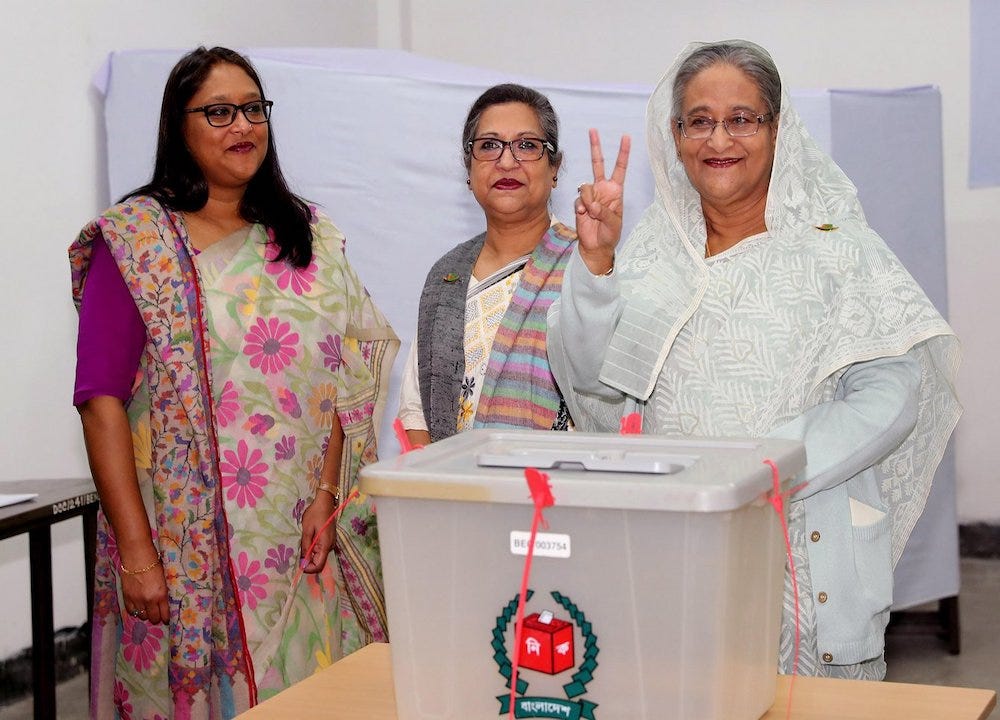
It was bound to happen.
In the tumult of the United States election crisis where President Donald Trump is refusing to concede, Bangladesh’s Chief Election Commissioner has remarked that the US can learn a lot from the Bangladesh elections!
From the perspective of contemporary Bangladesh, the US elections are rather disorientating. It seems so improbable that an incumbent leader would not win the election and instead criticise the fairness of the vote. This is not something that could ever happen right now in Bangladesh.
The reason why Donald Trump finds himself in a situation so different from that faced in recent elections by Sheikh Hasina is that although President Trump, may well be willing to subvert any kind of democratic institution or norm, US democratic institutions restrict him from doing what the Awami League can do. That is to say, unlike Sheikh Hasina, Trump was not able to rig the elections to ensure that he won it before the voting even took place. Trump has only been able to seek to sabotage the results after he lost the election.
Let’s take Bangladesh’s most recent election.
In December 2018, Sheikh Hasina and the Awami League used the police and the party’s student wing to take control of the voting stations and stuff the ballot boxes the night before the election. And this was just the icing on the cake. Before that the government appointed a partisan election commission, candidates were disqualified, opposition activists arrested, opposition party rallies attacked and opposition voters were prevented from going to the polls. In effect, Sheikh Hasina was able to harness the whole administration and bureaucracy to ensure that it won the election. It was a foregone conclusion.
Though he may have jumped at the chance, Trump was unable to do any of these things. Though the election system in the US is far from perfect, independent non-partisan institutions exist to prevent the government of the day from rigging the election in this way.
This is the huge difference between the elections in the two countries. Bangladesh has no democratic institutions that act independently. They all do the ruling party’s bidding.
Indeed this was a point made by the one independently minded election commissioner Mahbub Talukder who said, sarcastically on Wednesday that Trump must be thinking: “Since we haven’t learnt from Bangladesh, I’m losing the election.”
In Bangladesh things were once rather different.
In four elections between 1991 and 2008, there was an independent caretaker government which took charge of the national elections preventing the ruling party from suborning the administration and electoral institutions. In three of those elections, the party that had most recently been in power lost. And although the losing party whined a lot about the unfairness of the vote, they could not do anything about it as the caretaker government was effectively in power until the winning party took over. Elections were not perfect, but at least they were competitive events.
This all changed because, after the 2009 election, Sheikh Hasina had a super majority in parliament that allowed her to amend the constitution removing the need for establishment of an election period caretaker government. Why subject yourself to the risk of losing when you can determine your own victory?
Removing the caretaker government brought an end to competitive elections — since then the Awami League has ‘won’ two further elections through its control of the administration and law enforcement authorities — ensuring that the party will remain in power for the foreseeable future.
Trump is an authoritarian restrained by democratic institutions. Hasina is an autocrat with no such limits. If Trump lived in Bangladesh, there would now be no need for him to come from behind. He would already have won.
//David Bergman









